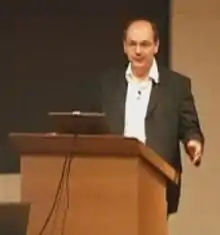François Fages
François Fages (August 23, 1959) is a French computer scientist known for contributions in the areas of unification theory, rule-based modelling, logic programming,[1] concurrent constraint logic programming,[2][3] computational biology and systems biology.
François Fages | |
|---|---|
 Fages in May 2008 | |
| Born | 23 August 1959 |
| Nationality | French |
| Citizenship | French |
| Known for | Fages Theorem |
| Spouse | Colette Fages (m. 1984) 3 children |
| Awards | Monpetit Prize |
| Scientific career | |
| Fields | Computer Science |
| Institutions | INRIA |
| Doctoral advisor | Gérard Huet |
| Doctoral students | 29 |
Early life and education
Fages was born in Paris, France. He studied Mathematics and Physics at Université Paris-Sud, Computer Science at the Université Pierre et Marie Curie and received his PhD from the Université Pierre et Marie Curie under the supervision of Gérard Huet, in 1983 at age 23.
Career
Fages took a junior researcher position from CNRS at Ecole Normale Supérieure, and became in addition, part-time teacher at Ecole Polytechnique from 1985 to 1998, and part-time consultant at Thomson-CSF (now Thales Group) research center from 1985 to 1996. Since 1999, he is a senior researcher at the Institut national de recherche en informatique et en automatique (INRIA), the French national research institute on computer science and control.[4]
He is known in unification theory for having shown the non-existence of minimal sets of unifiers in some equational theories (conjecture of Plotkin, 1972),[5] and the decidability of associative-commutative unification[6] in presence of several function symbols (conjecture of Stickel, 1981[7]).
In rule-based modelling, he is known for having created in 1988 a reactive rule-based language at Thomson-CSF (now Thalès group), which was later industrialized by ILOG (now IBM-Ilog) and became ILOG-Rules in 1996.
Fages theorem states that in a logic program with negations, but without circuits through an odd number of negations, the stable models of the program coincide with the Herbrand models of its Clark's completion. This result has shown useful for implementing stable model semantics with classical propositional satisfiability solvers.[8] In concurrent constraint logic programming, he has established with Paul Ruet and Sylvain Soliman the logical semantics of concurrent constraint programs in Jean-Yves Girard's linear logic. This result has been generalized to Constraint handling rules[9] and to the asynchronous Pi-calculus.[10]
In 2010 Fages co-ordinated a project to use mathematics to improve the packing of light bulbs and other oddly shaped products.[11]
In 2014 Fages works in computational systems biology, coordinates the development of the Biochemical Abstract Machine (BIOCHAM) rule-based modeling and logical analysis software and studies biochemical processes in the cell cycle and in cell signaling.
In 2014, he received the Monpetit Prize from the French Academy of Sciences.[12]
References
- Philippe Codognet (14 November 2001). Logic Programming: 17th International Conference, ICLP 2001, Paphos, Cyprus, November 26 - December 1, 2001. Proceedings. Springer Science & Business Media. pp. 242–. ISBN 978-3-540-42935-7.
- Frédéric Benhamou; Narendra Jussien; Barry A. O'Sullivan (25 May 2007). Trends in Constraint Programming. Wiley. ISBN 978-1-905209-97-2.
- John Mylopoulos; Ray Reiter (1991). Advance Papers of the ... International Joint Conference on Artificial Intelligence. Morgan Kaufmann. p. 378. ISBN 978-1-55860-160-4.
- "EU project takes the pain out of packing". CORDIS.
- Plotkin, Gordon (1972). "Building-in equational theories". Machine Intelligence. 7: 73–90.
- Jean-Pierre Jouannaud (1 October 1985). Rewriting Techniques and Applications: Dijon, France, May 20-22, 1985. Springer Berlin Heidelberg. ISBN 978-3-540-15976-6.
- Stickel, Mark (1981). "A Unification Algorithm for Associative-Commutative Functions". Journal of the Association for Computing Machinery. 28 (3): 423–434. doi:10.1145/322261.322262. S2CID 8163326.
- Erdem, Esra; Lifschitz, Vladimir; (2001) "Fages' Theorem for Programs with Nested Expressions". Proc. ICLP 2001:242-254, MIT Press.
- Betz, Hariolf; Frühwirth, Thom (2005). "A Linear-Logic Semantics for Constraint Handling Rules". Proc. Principles and Practice of Constraint Programming - CP 2005:137-151, Springer-Verlag.
- Palamidessi, Catuscia; Saraswat, Vijay; Valencia, Franck (2006). "On the Expressiveness of Linearity vs Persistence in the Asychronous Pi-Calculus". Proc. Logic in Computer Science - LICS 2006:59-68.
- "Mixing Math and Expertise". Communications of the ACM, March 12, 2010
- "Chercheurs primés" Archived 2015-09-22 at the Wayback Machine. Foundation Sciences, 2015.
External links
- François Fages's homepage: http://lifeware.inria.fr/~fages
- BIOCHAM's web site: http://lifeware.inria.fr/biocham
- List of publications from the DBLP Bibliography Server
- List of publications from PubMed
- "Presentation - LIFEWARE - Inria". Inria.fr.
- François Fages at the Mathematics Genealogy Project
- Google Scholar report